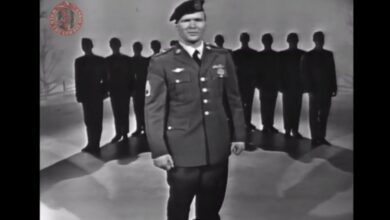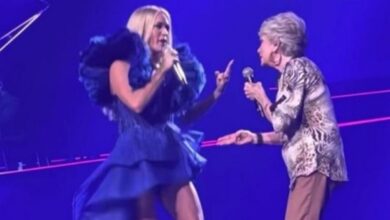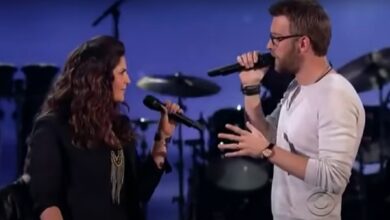Dolly Parton and Vince Gill’s duet of “I Will Always Love You” left us breathless and spellbound.
Dolly Parton and Vince Gill’s rendition of “I Will Always Love You” is a powerful testament to the song’s emotional depth and cultural importance. First written and recorded by Dolly Parton in 1973 as a heartfelt farewell to her mentor Porter Wagoner, the song reflects themes of love, loss, and gratitude. Parton’s profound connection to the piece allows her performance to resonate with listeners on a deep level, while Gill’s contribution enriches its narrative. Their collaboration exemplifies the heartfelt intention behind music, revitalizing a classic that has been cherished across generations.
Parton’s artistic journey began in the modest environment of Eastern Tennessee, where she grew up in a large, impoverished family. This upbringing was instrumental in shaping her storytelling abilities and musical talent. Influenced by the folk traditions surrounding her, Parton crafted a unique songwriting style that intricately weaves emotion with narrative. Her original version of “I Will Always Love You” reflects her roots, offering listeners an intimate glimpse into her life experiences and significant relationships. By tapping into her personal history, Parton infuses the song with a timeless authenticity that resonates with audiences.
In contrast, Vince Gill’s musical path originated in Oklahoma, where he developed his skills in various bands before achieving solo fame. Renowned for his smooth vocals and outstanding guitar playing, Gill has established himself not only as a performer but also as a highly regarded songwriter and producer. His career, characterized by numerous accolades, highlights his versatility and dedication to the country music genre. When he joins Parton for this duet, he brings his unique flair and emotional resonance, beautifully complementing Parton’s bright soprano with his warm baritone.
Recorded in 1995 during a peak time for both artists, the duet benefits from their shared history and mutual respect. This foundation fosters a harmonious collaboration evident in their vocal performances. Gill’s harmonies elevate Parton’s lead, while her delivery allows him to shine in his moments. The intricate layering of their voices symbolizes the themes of the song, illustrating the nuanced relationship between two individuals filled with both joy and melancholy.
The arrangement of their duet enhances its emotional impact. While elaborate productions can sometimes overshadow a song’s core message, the simplicity of the instrumentation in this case amplifies the song’s emotional weight. The gentle strumming of the guitar and subtle piano creates a serene atmosphere that draws listeners deeper into the lyrics. By opting for understated production, the duet invites an authentic emotional engagement, clear of distractions.
As the song unfolds, listeners are taken on a journey of gradually intensifying emotions. Each verse reveals deeper layers of longing and reflection, fostering a connection between the two artists that creates an intimate listening experience. With each note, they express a shared understanding of the song’s themes—an understanding that transcends their individual interpretations and resonates with the broader human experience.
Over the years, “I Will Always Love You” has been covered by many artists, notably Whitney Houston, whose version propelled the song into mainstream popularity. Each cover brings its own nuances, yet the fundamental sentiment remains intact. The collaboration between Parton and Gill highlights the song’s versatility, preserving the tender narrative of love and gratitude while offering fresh perspectives through their distinctive vocal harmonies.
Dolly Parton’s influence reaches far beyond music; she is a cultural icon dedicated to philanthropy and advocacy. Her initiatives, such as the Imagination Library, underscore her commitment to education and literacy, illustrating her belief in the transformative power of storytelling. Similarly, Vince Gill’s contributions to the music industry include numerous charitable efforts, reinforcing the idea that great artists often use their influence to create positive change.
Ultimately, the duet of “I Will Always Love You” by Dolly Parton and Vince Gill represents not just a remarkable collaboration between two legends but also a testament to the song’s lasting legacy. It highlights how deeply music can convey human emotion, showing that a well-crafted song can connect with audiences across time and space. Their performance celebrates love, loss, and shared connections, affirming the power of music to heal and unite us, even in moments of separation.
In this collaborative effort, both artists demonstrate their mastery of song and storytelling, illustrating how deeply personal experiences can evolve into universal themes. Through their voices, they resonate with the timeless sentiments embedded in “I Will Always Love You,” ensuring the song will continue to touch listeners’ hearts for years to come. This duet serves as a poignant reminder that, regardless of the passage of time, the emotional truths expressed through music remain constant, fostering connections among people everywhere.





